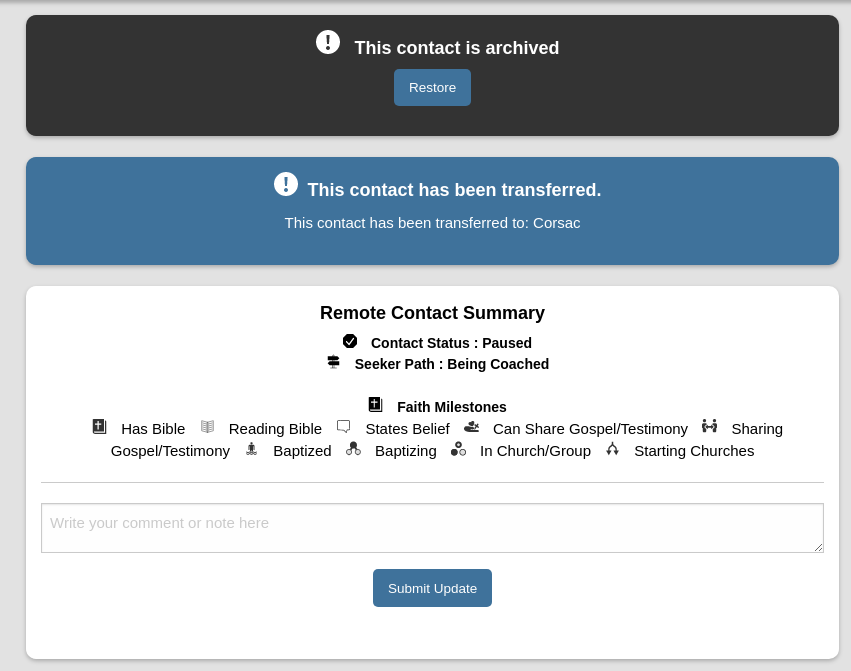Contact and User Changes:
- Admins/dispatchers can access all users-contact records.
- New users will automatically have their user-contact shared with them.
- New "This contact represents a user" and "This contact represents you as a user." banner on the contact record
- Link to user-contact in profile settings, if you have access to it
- Removed the modal on the record to "create a user from this contact" and merged in with the user-management new contact section
- Add option to archive comments when inviting a user from an existing contact
- Simplify new contact form removing connection type from view. Rename contact types: Standard and Private
- Add new contact type "Connection"
- Ability to hide "Private Contact" type
New Features
- Ability to disable user registrations by @ChrisChasm
- Add Signal, WhatsApp, iMessage and Viber options when clicking a phone number by @micahmills
- Ability to choose color settings an Dropdown fields by @kodinkat
Dev Changes
- API: Better handle comments with invalid dates by @kodinkat
- Fix text fields displaying incorrectly when mixing right-to-left and left-to-right fields by @corsacca
More info
1. Admins/dispatchers can access all users-contact records.
This keeps a dispatcher from loosing access to a record when the contact type is changes to User from access.
2. New users will automatically have their user-contact shared with them.
Existing users won't automatically have access to their user-contact to avoid sharing private information.
The aim is to up clarity and collaboration between admins and the new user. And provide a place form some basic conversation.

3. New "This contact represents a user" and "This contact represents you as a user." banner on the contact record
If you are looking at your contact record you will see this banner with a link to your profile settings
 If your are an admin looking at the user-contact for another user, then you will see this banner:
If your are an admin looking at the user-contact for another user, then you will see this banner:

4. Link to user-contact in profile settings

6. Add option to archive comments when inviting a user from an existing contact
If a contact record comments contains sensitive data, this will give the admin a change to archive those comments. These comments get moved to a new record that is only shared with the user who previously had access to the record

7. Simplify new contact form removing connection type from view

8. Add new contact type "Team connection"
Contact types:
- Private Contact: visible to user who created it
- Private Connection: visible to user who created it
- Standard Contact: visible to Admins, dispatchers and user who created it
- Connection: visible to Admins, dispatchers and user who created it
- User: visible to Admins, dispatchers and user who created it
Contact type documentation: https://disciple.tools/user-docs/getting-started-info/contacts/contact-types
9. Ability to hide "Private Contact" type
Only want collaborative contacts? Head over to WP-Admin > Settings (D.T). Scroll to the "Contact Preferences" section and uncheck the "Personal Contact Type Enabled" checkbox. Click Update

10. Ability to disable user registrations
If a multisite has user registrations enabled globally, this setting allows you to disabled it for a specific D.T instance. See WP Admin > Settings (D.T) > Disable Registration

11. Add Signal, WhatsApp, iMessage and Viber options when clicking a phone number

12. Ability to choose color settings an Dropdown fields by @kodinkat
Some dropdown fields have colors associated with each option. For example the Contact Status field. These are now customizable.
Find the field option by going to WP Admin > Settings (D.T) > Fields. Choose the post type and the field.

Full Changelog: https://github.com/DiscipleTools/disciple-tools-theme/compare/1.21.0...1.22.0






 If your are an admin looking at the user-contact for another user, then you will see this banner:
If your are an admin looking at the user-contact for another user, then you will see this banner:

















 Get News
by Email
Get News
by Email